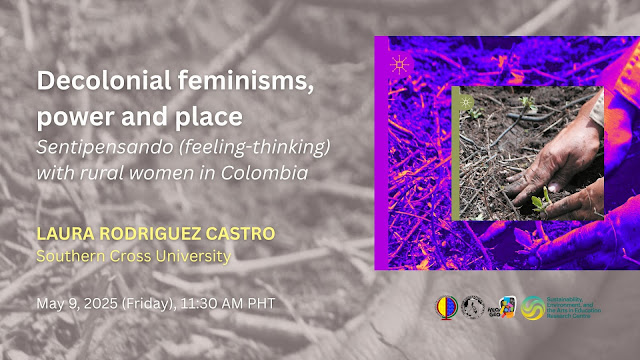10 July 2025
Heo/Geo Lecture Series 2025-07: Hanna Aguilon on empowerment through GIS technology
15 June 2025
Heo/Geo Lecture Series 2025-06: Joycel Dabalos on the literary imagination of disaster
How does fiction imagine a disaster? How does the imagined disaster disturb/redefine the Filipino concept of family?
For the sixth Heo/Geo Lecture for 2025, Joycel Vincent Dabalos' talk titled Rain and River: How Fiction Imagines Disaster and Disappearance, shares how he creatively wrote his two young adult stories populated with Filipino characters dealing with the wrath of disaster while carrying their distinct (yet playful) Filipino family identities. The lecture which is co-presented by the UP Department of Geography and the Philippine Geographical Society (PGS) will include his writing politics—how he perceives tangible world and how his stories offer an alternative world. The talk will take place via Zoom on Friday, 20 June 2025 at 5:30PM.
Joycel Vincent V. Dabalos is a creative writer and literature educator. He penned "Kulimlim: Mga Imahen ng Paglaho" (2024) and "Heterotopic Dissidences" (2025). He is currently completing his PhD in Philippine Studies (Presidential Scholarship Grant) at the University of the Philippines-Diliman. He obtained his MA in Language and Literature from De La Salle University Manila. He is a fellow for maikling kuwento of the 12th Palihang Rogelio Sicat held at UP Los Baños. His poems have been featured in the Heights Ateneo, Kawing Journal, and panitikan.ph. His latest poem "The Long History of Virus" will be published in ANI 42, the literary journal of the Cultural Center of the Philippines. His research interests span heterotopic spaces, queer disaster, narrative theory, literary ecology, and creative writing.
Jointly presented by the Geographies of Disasters and Hazards (G-DASH) and Media, Literary Geographies and Geohumanities (MELANGE) research clusters of the UP Department of Geography, the talk satisfies the Social Development Goals of United Nations Sustainable Development especially #4 (Quality Education) and #15 (Life on Land).
The Heo/Geo Lecture Series started out as the Brown Bag Lecture Series/Geography Webbynar but later rebranded as Heo/Geo to accommodate the multiple ways Geografia/Heograpiya is perceived. The lecture series in its present iteration serves and provides a space where practical, discursive and embodied discussions and performativities from academic geographers, geography-adjacent scholars, practitioners and civil society can come together and share ideas to popularise the discipline of geography.
To register for the lecture, please click this link to participate.
06 May 2025
Heo/Geo Lecture Series 2025-05: Laura Rodríguez Castro on ancestral knowledges and on research that is participatory and politically grounded
In Epistemologies of the South, Boaventura de Sousa Santos acknowledges that the transformation of the world comes from alternative perspectives that 'reinvent social emancipation on a global scale' (2016).
Along these lines and embedded in Latin American (Abya Yala) ancestral knowledge, sentipensar (feeling-thinking) has developed as a way of feeling and knowing the world. From the experiences of Colombian fishermen (Escobar 2014; Fals Borda 2015) to the ancestral living of the Mayan Tzeltal in the Chiapas highlands of Mexico (Méndez Torres et al. 2013), feeling and thinking processes are experienced as interconnected and fundamental to living in harmony with mother earth (Pachamama).
The Heo/Geo Lecture Series, co-sponsored by the UP Department of Geography and the Philippine Geographical Society (PGS), presents a talk entitled 'Decolonial feminisms, power and place: Sentipensando (feeling-thinking) with rural women in Colombia' by Laura Rodríguez Castro. The talk is scheduled on Friday, 9th of May 2025 at 11:30AM (PHT) and 1:30PM (AEST).
In this talk, Dr Rodríguez Castro reflects on embodying and understanding feeling-thinking and its entanglement with undertaking participatory research that is politically grounded in decoloniality and feminisms. She proposes that feeling-thinking addresses epistemic questions of the praxis of decoloniality, including how we embody research, how we understand place and how we unlearn to feeling-know other worlds.
Dr Laura Rodriguez Castro is a Colombian Vice-Chancellor Senior Research Fellow and educator at the Faculty of Education's Sustainability, Environment and the Arts in Education Research Centre at Southern Cross University, Australia. Her research focuses on Southern knowledges of anti/decoloniality and feminisms, critical and public pedagogies, memory studies and rurality. Her work also contributes to methodological debates on arts, visual and participatory methods. She is an Associate Editor for the Journal of Intercultural Studies. Laura’s book with Palgrave Decolonial Feminisms, Power and Place: Sentipensando with Rural Women in Colombia (2021) explores how rural women enact and imagine decolonial feminist worlds.
As in previous iterations, the Heo/Geo Lecture Series aims to bring various geography practitioners from the academy, civil society, industry and community to share their geography-informed research, pedagogies and practices that operate in multiple scales. This lecture is facilitated by the Human Geography (HUG) and Media, Literary Geographies, and Geohumanities (MELANGE) research groups of the UP Department of Geography. It also satisfies the Social Development Goals #4 (Quality Education) and #15 (Life on Land) of the United Nations Sustainable Development.
To participate in our Lecture Series, please register through this link or paste this in your URL: https://tinyurl.com/ms572xk8




